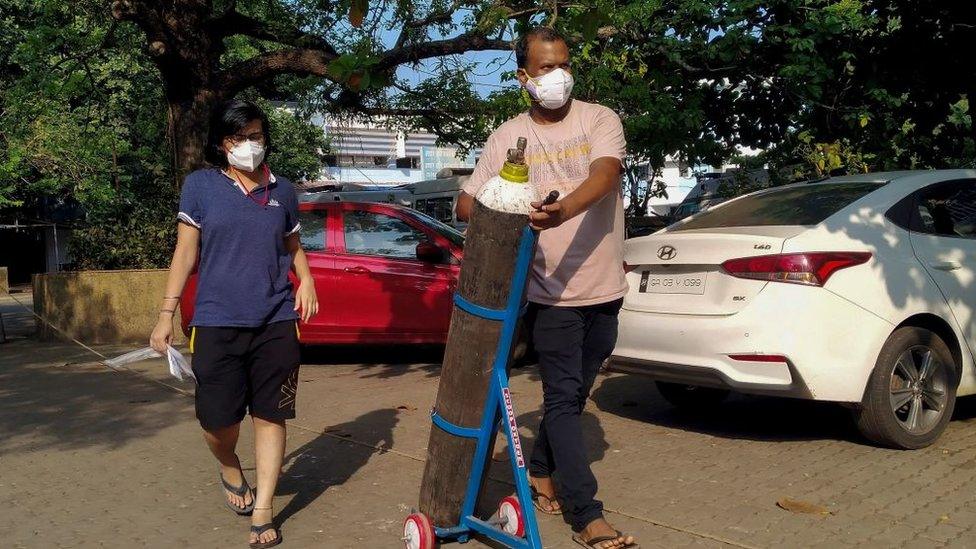Covid-19: India outrage over 'no oxygen shortage death data' claim
- Published

Many Indian Covid patients died from a lack oxygen in April and May
Indians have expressed shock and anger after a junior health minister told parliament that no Covid deaths had been reported due to oxygen shortages.
Hospitals across the country ran out of oxygen in April and May during a deadly second wave - there were daily reports of people dying from a lack of oxygen.
But the government said on Tuesday that "no deaths due to lack of oxygen has been specifically reported by states".
India has reported more than 418,000 Covid deaths so far.
And more than half of those happened after 16 April when Covid cases began to climb sharply.

Families began stocking up cylinders for their loved ones
Dr Gautam Singh, who runs a 50-bed hospital in Delhi, told the BBC that there was an acute shortage of oxygen in April and May. "We were managing oxygen on an hourly basis. We came so close to losing patients. Somehow we begged and borrowed to save our patients. But I do know other hospitals that lost patients due to the shortage."
India's health infrastructure began to crumble as the demand for hospital beds, oxygen and medicines soared. Social media was flooded with desperate pleas for help from both families and doctors as patients gasped for breath. The trauma was on vivid display day after day and made global headlines.
So, the government's statement that it had no data on oxygen deaths has angered and shocked Indians.
Allow X content?
This article contains content provided by X. We ask for your permission before anything is loaded, as they may be using cookies and other technologies. You may want to read X’s cookie policy, external and privacy policy, external before accepting. To view this content choose ‘accept and continue’.

Allow X content?
This article contains content provided by X. We ask for your permission before anything is loaded, as they may be using cookies and other technologies. You may want to read X’s cookie policy, external and privacy policy, external before accepting. To view this content choose ‘accept and continue’.

"Health is a state subject. Detailed guidelines for reporting of deaths have been issued by the central health ministry to all states and Union Territories," said Bharati Pawar, junior minister for health and family welfare in Prime Minister Narendra Modi's government
She added that they had not received any reports about deaths due to the oxygen shortage.
Ms Pawar was answering a question raised by opposition MP KC Venugopal in the Rajya Sabha (the upper house of parliament) on "whether a large number of Covid patients died on roads and hospitals due to acute shortage of oxygen in the second wave?"
People appeared furious and hurt that the government was relying on a technicality - that states had not reported any deaths "specifically" from a lack of oxygen - and not acknowledging the horrific reality that so many families faced.
Allow X content?
This article contains content provided by X. We ask for your permission before anything is loaded, as they may be using cookies and other technologies. You may want to read X’s cookie policy, external and privacy policy, external before accepting. To view this content choose ‘accept and continue’.

Allow X content?
This article contains content provided by X. We ask for your permission before anything is loaded, as they may be using cookies and other technologies. You may want to read X’s cookie policy, external and privacy policy, external before accepting. To view this content choose ‘accept and continue’.

Allow X content?
This article contains content provided by X. We ask for your permission before anything is loaded, as they may be using cookies and other technologies. You may want to read X’s cookie policy, external and privacy policy, external before accepting. To view this content choose ‘accept and continue’.

The BBC and other media reported extensively on the oxygen shortage in hospitals, including in major cities such as the capital, Delhi. In one prominent Delhi hospital, at least 12 patients, including a doctor, died when it ran out of oxygen on 1 May.
Many hospitals were relying on daily supplies. It was worse in small hospitals that didn't have storage tanks and had to rely on big cylinders. Images of people queuing up to fill oxygen cylinders soon became a familiar sight.
"It's a battle we are fighting every day," Dr Gautam Singh told the BBC at the time. "Half of my hospital staff are on the road with cylinders to get them filled every day, going from one place to another."
India's government has previously come under criticism for major gaps in its Covid data - experts say the case counts and deaths are both severely under-reported.

'A person cannot even die peacefully in Delhi'